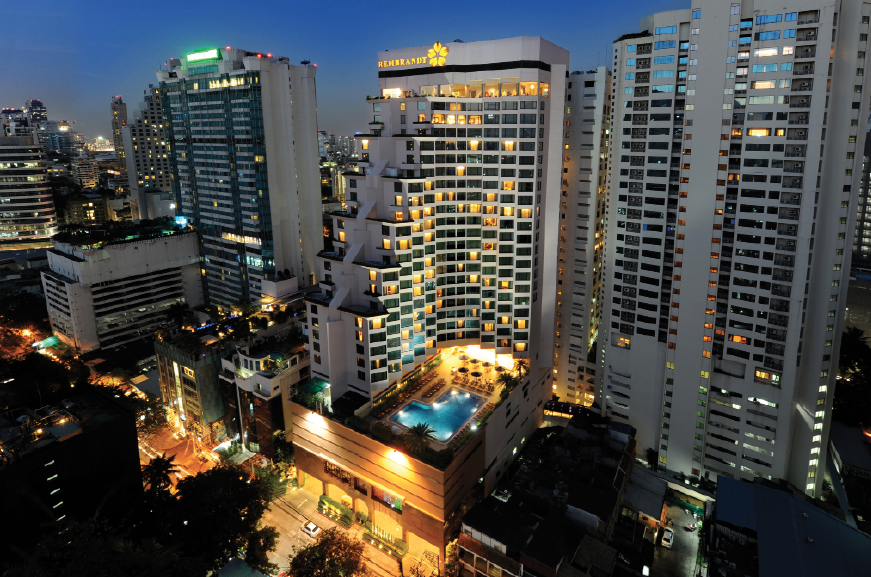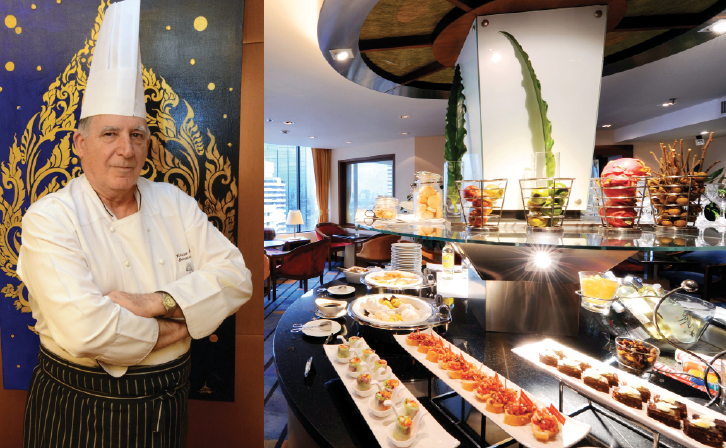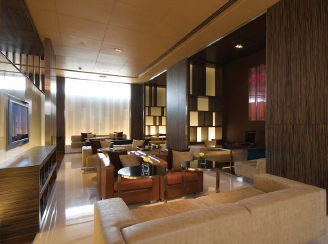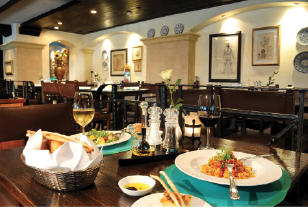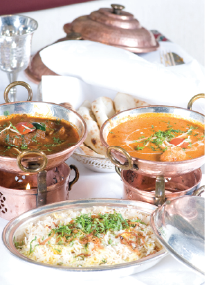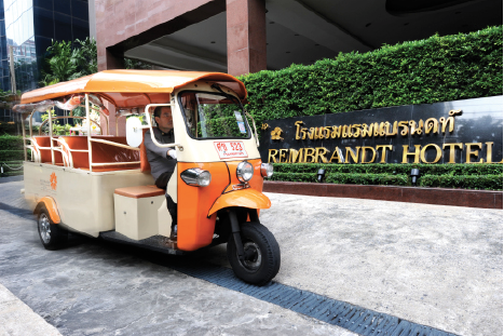Iconic Sukhumvit landmark celebrates 23 years of service this month
| SINCE opening its doors to the public on July 5, 1993, the Rembrandt Hotel Bangkok has perfected the art of the hospitality experience. Not only has it scooped numerous awards for the quality of its rooms, green initiatives, and superb restaurants, but it’s also won the hearts and minds of travellers from throughout Asia, Europe and the States who return year-upon-year to enjoy the property’s unmistakable, personal touch – it’s probably one of the ‘homeliest’ four-star hotels operating in Bangkok today. And it’s hard not to fall in love with it. Comprising 407 rooms and stewarded for the past eight years by the affable and ever-present GM Eric Hallin, a Swedish hotelier with over 40 years’ experience in the trade, the hotel enjoys an enviable location in a safe and secluded sanctuary on Sukhumvit Soi 18, just seven minutes from the Skytrain and underground MRT train stations. And it proves just as big a draw to leisure and business travellers as it does to locals and expats. |
Top 5 Rembrandt experiences
|
Drawing in the latter are the hotel’s five high-end affordable restaurants including, among them, the renowned authentic Mexican restaurant Mexicano (read our full review online at bit.ly/28KYIqK), Rang Mahal, one of Bangkok’s best Indian restaurants (which serves exquisite authentic regional and traditional dishes), and Da Vinci, which specialises in Italian cuisine made using fine imported produce as well as seasonal ingredients.
Thanks to the hotel’s spacious, well-appointed accommodation, and long list of on-site facilities – including a large swimming pool, fully-equipped fitness centre, fabulous spa, and neat touches like the wonderful Lobby Bar with two happy hours and a pianist in the evenings – the Rembrandt is also a great choice for an inner-city staycation. The hotel’s superbly designed rooms and suites offer excellent views, luxury bathrooms, complimentary wireless internet access, and 24-hour room service. Personal comforts include bathrobes and slippers, large LCD flat screen televisions with international channels, and state-of-the-art amenities. A more intimate and personalized guest experience is available on the Executive Floors (which offer an amazing view of the city), including an exclusive reception desk providing express check-in and-out, meeting room, and complimentary beers, wines and spirits (served daily from 5.30pm-7.30pm). As the Rembrandt is kept fully up to date with all the latest tech, guests can book rooms and reserve restaurant tables with just one click via the hotel’s Facebook page or website. Going green The Rembrandt Hotel Bangkok prides itself on being a pioneer in Effective Microorganism (EM) Cleaning. Extracted from organic compost, such as fruits and flowers, EM has been widely accepted as a successful natural substitute for cleaning chemicals with its eco-friendly, non-toxic qualities. Other initiatives are aimed at reducing the Rembrandt’s carbon footprint. They include a complete replacement and refurbishment of the hotel’s chillers, boilers, implementation of heat exchange systems, digital signage and directories, paperless office initiatives, and other technologies. The hotel has also begun switching all lighting to LED, including rooftop signage, lobby bar light schemes and elevator lighting and is expanding the use of this technology into its rooms and restaurants. |
Rembrandt Hotel Bangkok – the GM’s perspective
After eight years at the helm, Swedish General Manager Eric Hallin is very much part of the hotel’s DNA. And he’s rightly proud of the property
| Why the name Rembrandt? The owners wanted to keep the hotel as an independent hotel, without the power of one of the big hotel brands. They therefore looked for a name that would be easily recognisable and also symbolise quality. Rembrandt just looked right and time proved them right. What has changed in the past 23 years? Bangkok has changed a lot in the last 23 years. When Rembrandt was opened in 1993 there were less than 45,000 rooms in Bangkok and today there are over 130,000 rooms. The city has grown, we have two airports running at capacity and still the supply outstrips the demand. There are also a lot more restaurants and eating venues. It is competition that has grown quicker than anything else. Your guests come in healthy numbers from many countries, especially Europe and Asia. How do you run a successful business with a good reputation for these ever-changing markets? We are very mindful of upkeep and we constantly improve the hotel to stay current against the growing competition, and to remain the home away from home for our guests. We also have a good team to provide friendly services and good food. All these things are so important, and even more so today with the growth of Social Media as we are constantly judged on quality and value. This can be a wonderful opportunity, though. |
What are some of the challenges in the hotel business today?
As I mentioned earlier, the oversupply of rooms on the market with lower rates than the rest of the region is affecting profitability, as is the increased cost of labour (which is also in low supply). We will need to keep pushing for better destination marketing of Bangkok. It is a wonderful city with so much to do and see. It is vibrant and we often refer to it as the New York of Asia. We are still very positive about tourism in Bangkok, and we hope we will eventually be able to command rates comparable to our Asian neighbours so that we can keep investing in constant improvements.
Only two GMs in 23 years is unusual for the hospitality industry. Has this played a big part in the hotel’s success?
The Rembrandt is very fortunate to have had very good hotel owners that have allowed us to run the hotel as an independent hotel against the many international brands. Stability and constant support in improving and upgrading the hotel has very much been a part of our success. Many of our staff have been with us for more than twenty years and still continue to be passionate at maintaining the service and friendly Thai hospitality our many regular guests have come to expect.
Corporate Social Responsibility (CSR) is very important now through the industry. What are you most proud of at Rembrandt in this regard?
Even though the Rembrandt is a small company, we are proud that we are supporting many good causes as well as trying to reduce our carbon footprint. All the rice in our restaurants and canteen are from Meechai’s BREAD foundation that supports school children in Buriram at the Bamboo school project. Our used cooking oils are given to an orphanage operated by the Sai Baba foundation to produce bio-diesel. We support many foundations such as Prateep in the Klong Toey slums, where we sponsor some of the students, as well as the Holy Shepard Sisters’ work in the Din Daeng slums. We also support a hotel school for hill tribe children in Tak Province, as well as the LANITH hotel school in Laos, and, in conjunction with the UN, we work with vulnerable refugee ladies in Laos to teach them the hotel trade.
Given a crystal ball, what future do you see for the hotel?
It is always difficult to look into a crystal ball to foresee the future. However, as the workforce gets smaller mainly due to competition and rising costs, I see more behind the scenes automatisation to be able to give more dedicated service directly to the guests by fewer but better paid staff. We will need to work smarter, we will need to be competitive in our product and keep modernising without losing our focus on service. Most of all, I would like to thank our three most important contributors – our staff, our loyal guests, and our owners that make this all possible.
For more info visit rembrandtbkk.com
As I mentioned earlier, the oversupply of rooms on the market with lower rates than the rest of the region is affecting profitability, as is the increased cost of labour (which is also in low supply). We will need to keep pushing for better destination marketing of Bangkok. It is a wonderful city with so much to do and see. It is vibrant and we often refer to it as the New York of Asia. We are still very positive about tourism in Bangkok, and we hope we will eventually be able to command rates comparable to our Asian neighbours so that we can keep investing in constant improvements.
Only two GMs in 23 years is unusual for the hospitality industry. Has this played a big part in the hotel’s success?
The Rembrandt is very fortunate to have had very good hotel owners that have allowed us to run the hotel as an independent hotel against the many international brands. Stability and constant support in improving and upgrading the hotel has very much been a part of our success. Many of our staff have been with us for more than twenty years and still continue to be passionate at maintaining the service and friendly Thai hospitality our many regular guests have come to expect.
Corporate Social Responsibility (CSR) is very important now through the industry. What are you most proud of at Rembrandt in this regard?
Even though the Rembrandt is a small company, we are proud that we are supporting many good causes as well as trying to reduce our carbon footprint. All the rice in our restaurants and canteen are from Meechai’s BREAD foundation that supports school children in Buriram at the Bamboo school project. Our used cooking oils are given to an orphanage operated by the Sai Baba foundation to produce bio-diesel. We support many foundations such as Prateep in the Klong Toey slums, where we sponsor some of the students, as well as the Holy Shepard Sisters’ work in the Din Daeng slums. We also support a hotel school for hill tribe children in Tak Province, as well as the LANITH hotel school in Laos, and, in conjunction with the UN, we work with vulnerable refugee ladies in Laos to teach them the hotel trade.
Given a crystal ball, what future do you see for the hotel?
It is always difficult to look into a crystal ball to foresee the future. However, as the workforce gets smaller mainly due to competition and rising costs, I see more behind the scenes automatisation to be able to give more dedicated service directly to the guests by fewer but better paid staff. We will need to work smarter, we will need to be competitive in our product and keep modernising without losing our focus on service. Most of all, I would like to thank our three most important contributors – our staff, our loyal guests, and our owners that make this all possible.
For more info visit rembrandtbkk.com

